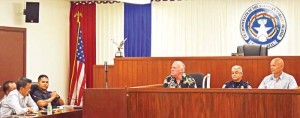‘1,032 overstaying tourists worked illegally’
Customs and Border Patrol field operations director Brian J. Humphrey, third from right, Saipan Port director Robert Havens, second from right, and Hawaii Area Port director Bruce Murley answer questions from members of the Legislature in yesterday's joint meeting at the House Chamber of the Hon. Jesus P. Mafnas Memorial Building in Capital Hill. (Jon Perez)

The U.S. Customs and Border Patrol revealed that majority of the 1,032 tourists who they uncovered violated their parole authority by overstaying in the CNMI worked illegally in several companies. MCC International was among the companies that allegedly hired workers who have parole authority.
The parole authority is reserved for Chinese and Russian tourists while visitors from Japan and Korea enjoy the visa waiver program.
CBP Field Operations director Brian J. Humphrey, in a joint presentation to members of the Legislature yesterday, said although there’s no specific breakdown of those who illegally overstayed it is safe to say that most of them were Chinese.
“There’s no specific breakdown but we safely believe that a large number of those who unlawfully overstayed have the sole purpose of illegally working here. A number of those 1,032 come here under the Chinese parole,” said Humphrey.
“Some of these illegal workers had already left. For how long they stayed? It varies. But anyone that exceeds the 45 days, authorized by the [Department of Homeland Security] Secretary, overstayed. We work closely with DHS investigators and the task force.”
Humphrey said that additional consequences should be imposed for anyone that came into the CNMI as tourists, overstayed, and worked illegally. The same also should be done to those who enter the CNMI illegally.
He added that these actions done by some tourists had an adverse effect and would be inconvenient to other visitors whose sole purpose is for vacation and relaxation.
Humphrey said DHS’ primary responsibility is for all inland enforcement actions. “We’re working with [DHS] and have an agreement with them that if they come across individuals that have overstayed, they are going to bring that to our attention.”
“Of course, we share information on those that have illegally overstayed. We would then work with them to cooperatively having these individuals who overstayed removed.”
He said they would then revoke the parole authority of violators and send them home. “Those who violated are removed and the airlines that brought them here are ultimately responsible in providing space for them to return.”
Concern for CNMI
House Floor Leader Glenn L. Maratita (R-Rota) and Rep. Gregorio M. Sablan Jr. (R-Saipan) are united in saying that steps should be taken to put an end to the practice of hiring workers that enter the CNMI as tourists. They said it would gravely affect the CNMI’s tourism industry.
“What we are facing today is something that we can’t just sit down and wait. We need to take drastic measures over this and try to resolve it at the earliest possible time so we could provide convenience to our visitors,” said Maratita.
“Bear in mind that [the Marianas Visitors Authority] and [the Hotel Association of the Northern Mariana Islands] said we’re seeing growth in tourism. If this would be factored in, it won’t look good. It would have a devastating affect to us and there goes our economy. Again, we have to work together and try to resolve these issues for the sake of tourists.”
Sablan added that some of CBP’s roles are protecting the borders, the islands, and screen the papers of visitors if they are coming in legally for tourism purposes. “What’s going on with [Imperial Pacific International (CNMI) LLC] that’s one of the things that we wanted to prevent.”
“We can’t blame IPI but the companies that hired these workers illegally. Those who had done illegal work,” added the first-term lawmaker who was also a former Customs officer.
He then suggested to Humphrey to ask the U.S. Immigration and Customs Enforcement to bring additional agents or expand the local task force to reduce the number of those who are overstaying in the CNMI.
“It would be a deterrence to people that if you decided to stay here illegally, well guess what there’s a strong enforcement presence. You may be hiding, but eventually we’re going to catch you. We welcome anybody but come in legally, this is the message that we wanted to send.”





This was predicted from the time this was proposed and enacted. Guaranteed that these elected nd this whole Admin. were aware and also many were involved along with agencies involved with this Casino and other onfgoing developments.
This visa waiver has got to go as well as the CW program as it is today. Fix the CW program to run similar to existing Fed worker programs with time limits. Even allow “seasonal worker programs” for housekeeping and other non skilled workers jobs IF NEEDED.
Not as bad as legislators who overstay their term in office and can’t still figure out the back door!